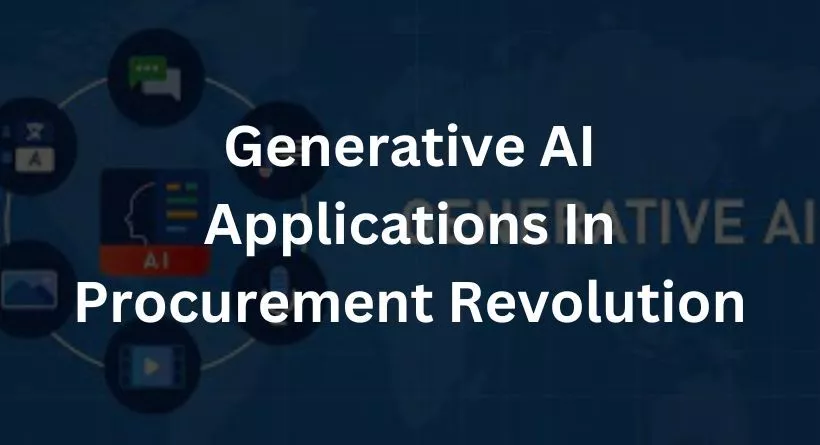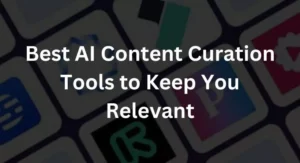
In today’s rapidly evolving digital landscape, Generative AI is at the forefront, reshaping how various industries envision, create, and operate. It goes beyond simple data interpretation, showcasing the ability to craft novel content, from art to strategies, all while mimicking the creativity of the human mind. As AI’s presence continues to grow across different sectors, one area poised for a significant transformation is procurement, a cornerstone of successful businesses. In this article, we will delve deep into the integration of Generative AI with procurement, exploring its transformative potential, real-world applications, and the future landscape of business procurement.
Understanding Generative AI

At its core, Generative AI is a branch of artificial intelligence models equipped to fabricate new data that resembles its training set. What sets it apart is its innate capacity to:
You may also like reading: Generative AI Applications: The Next Frontier in Fraud Prevention
Produce Novel Data:
Generative AI can spontaneously generate data that wasn’t part of its initial training. This ability opens doors to endless possibilities.
Learn Deeply:
It thrives on vast datasets, absorbing intricate patterns within them, which enables it to generate more contextually relevant content.
Emulate Creativity:
In contrast to traditional models, Generative AI is capable of curating distinctive outputs rooted in its learning. This feature makes it ideal for creative applications.
For context, let’s explore its applications across various industries:
Knowledge Management:
In knowledge management, Generative AI can sculpt new knowledge artifacts by assimilating the architecture of pre-existing content. This leads to the creation of valuable resources.
Virtual Assistants:
These AI models enhance the conversational capabilities of virtual assistants, making interactions with them eerily human-like. This improves user experience significantly.
Content Generation:
Generative AI’s creative touch is evident in content generation. Whether it’s writing articles, creating graphics, or composing music, the AI’s influence is unmistakable.
Contrast this with other AI models, primarily discriminative ones, which excel at classifying and distinguishing data. Generative models go beyond this and can conceptualize entirely new data based on their ingrained learning. This unique creativity is the essence of Generative AI.
The Current Landscape of Procurement
Procurement, a pivotal business function, traditionally revolves around sourcing goods and services efficiently. The age-old processes involve identifying needs, seeking suppliers, negotiating prices, and overseeing the acquisition of resources. However, this is often a manual, time-consuming affair marked by paperwork, vendor meetings, and constant evaluation. In today’s globalized world, procurement teams face numerous challenges:
Supply Chain Disruptions:
Unforeseen events like natural disasters or geopolitical issues can disrupt the supply chain, bringing business operations to a sudden halt.
Vendor Management Complexity:
As businesses expand, vendor management becomes intricate. Managing diverse suppliers, each with unique terms and conditions, can be a challenging task.
Cost Control Pressure:
There’s a constant pressure to maintain cost control. Procurement teams are always seeking the best quality at the most affordable price to ensure budgets aren’t exceeded.
To navigate these challenges, Generative AI has emerged as a promising ally. This technology not only streamlines and automates traditional processes but also offers predictive insights, making supply chain management more resilient and adaptable.
Generative AI is Revolutionizing Procurement
The integration of Generative AI into the procurement process is a revolution in the making. Businesses can enhance decision-making, anticipate risks, and ensure smoother operations:
Choosing the Right Vendors:
Procurement starts with selecting the right vendors. Generative AI, using sophisticated algorithms like Large Language Models, dives deep into vast datasets. For example, when searching for environmentally conscious suppliers, the AI can sift through data, highlighting those with genuine green credentials, glowing reviews, and cost-effective offerings. The result? An optimal blend of sustainability, quality, and cost.
Anticipating Challenges:
The unpredictable nature of procurement, from unexpected supply chain glitches to sudden vendor challenges, can be daunting. Here, Generative AI excels by diving into historical patterns and flagging potential issues. For example, by analyzing past events, AI could indicate potential supply interruptions during specific regional festivals. With such predictive insights, businesses can transition from a reactive stance to a proactive one.
Making Informed Decisions:
Generative AI acts as an expert consultant available round-the-clock. Need a particular product? AI swiftly identifies the perfect supplier, factoring in cost, delivery timelines, and quality. By continually learning, it refines its recommendations, ensuring optimal choices in the future.
Building Stronger Supplier Ties:
Building and maintaining supplier relations can be a balancing act. Generative AI streamlines this process. For instance, during supplier onboarding, an AI chatbot can expedite communications, ensuring clarity and speed. AI offers deeper insights into a supplier’s performance, comparing it against prevailing market dynamics and suggesting areas of improvement.
Strategic Category Management:
Generative AI brings clarity to the intricate world of category management. It offers real-time insights, pinpoints areas of savings, and suggests consolidation where needed, ensuring businesses always stay ahead of the curve.
Generative AI is not just a tool; it’s a transformational force, poised to redefine the procurement landscape. By integrating it, businesses can ensure they remain agile, informed, and ready to tackle the ever-evolving challenges of procurement.
Limitations and Concerns
While Generative AI presents vast opportunities, it’s essential to be aware of the associated challenges and limitations:
Dependence on Accurate Data:
Generative AI relies on accurate data. Feeding it flawed or biased data can lead to misleading outcomes, potentially resulting in significant consequences for procurement decisions.
Implementation Challenges:
Deploying Generative AI in traditional procurement environments may face resistance. Employees accustomed to certain workflows might resist change, and there’s the challenge of training staff to utilize the new system effectively.
Ethical Concerns:
Two primary ethical issues arise. First, the implementation of AI can lead to job displacement, especially for roles centered on routine tasks. Second, there’s the matter of decision transparency. With AI making complex decisions, ensuring clarity on how choices are made becomes crucial.
Human Oversight is Imperative:
Over-reliance on AI can be perilous. While AI aids decision-making, human judgment remains invaluable. There’s always a risk of AI models missing nuances or context, emphasizing the need for human intervention and oversight.
The Future of Generative AI in Procurement

The horizons of procurement are rapidly expanding, with Generative AI leading the charge. Here’s what we can expect in the future:
Evolving Capabilities of Generative Models:
In the coming years, Generative AI will continue to refine and expand its capabilities. It will predict market trends more accurately, assess supplier reliability in real-time, and offer more detailed procurement simulations, allowing businesses to make decisions with enhanced clarity and foresight.
Preparation for Increased AI Integration:
As AI becomes more central to procurement processes, businesses must prioritize workforce training and upskilling. Embracing an ethos of continuous learning and data hygiene will be critical to ensure AI systems are informed by quality, relevant data.
Convergence with Other AI Technologies:
Generative AI will increasingly work in tandem with other AI technologies. Integration with virtual assistants can streamline communication and tasks in the procurement process. Furthermore, AI-driven language translation tools will break down global communication barriers, allowing businesses to tap into suppliers and markets worldwide without the hindrance of language constraints. These interconnected AI tools will push procurement towards being more seamless, globally connected, and efficient.
Conclusion
In conclusion, Generative AI is reshaping procurement, offering innovative solutions and predictive insights to age-old challenges. Its integration into the procurement landscape is not just a transformation but a revolution. As businesses continue to adapt and harness the power of Generative AI, they will be better equipped to navigate the complex and ever-changing world of procurement.
FAQs
1. What is Generative AI, and how does it apply to procurement?
Generative AI is a subset of artificial intelligence that can create new data based on its training. In procurement, it streamlines decision-making, anticipates risks, and improves vendor selection.
2. What are the limitations of Generative AI in procurement?
Generative AI relies on accurate data, faces implementation challenges, and raises ethical concerns. Human oversight is crucial to avoid over-reliance on AI.
3. How can Generative AI help businesses in vendor selection?
Generative AI can sift through vast datasets to identify environmentally conscious suppliers with glowing reviews and cost-effective offerings, ensuring an optimal blend of sustainability, quality, and cost.
4. What role does Generative AI play in category management?
Generative AI provides real-time insights, identifies areas of savings, and suggests consolidation, helping businesses stay ahead in category management.
5. What does the future hold for Generative AI in procurement?
The future promises even more refined capabilities for Generative AI, increased AI integration, and convergence with other AI technologies, making procurement more seamless and globally connected.





